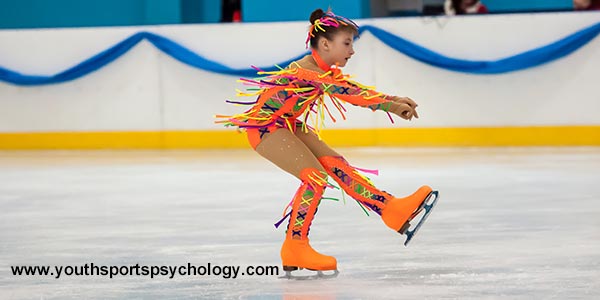
Help Young Athletes with Performance
Young athletes can become overwhelmed by crowds during games or performances.
Some kids feel anxious when the crowd claps; others feel energized.
One figure skater recently responded to our mental game survey and talked about what it feels like to perform in front of spectators.
“I get so overwhelmed and anxious 30 minutes before my program starts. I hear the crowd come alive as the skaters before me look flawless. Just before I step onto the ice, I see images of me falling and the crowd becoming quiet. I am so afraid to fall and embarrass myself that I become a nervous wreck. How can I overcome all these problems and skate better in front of a crowd?”
This skater is not the only athlete who mentioned these feelings. Sometimes it’s hard to step onto the ice and be greeted with cheers and applause.
The audience will applaud when skaters jump, but go silent if a skill doesn’t look impressive.
Skaters and other athletes need to stop thinking about how the crowd will judge them. This sparks anxiety and can hurt kids’ confidence. Fear and anxiety can create a self-fulfilling prophecy.
Instead, young athletes need to focus on themselves and stay in the present during their performance.
Three Options for Dealing with Large Crowds
1. Ignore the crowd. Some skaters and other athletes have learned how to be hyper-focused when playing or performing. These athletes are so immersed in their performance that they are unaware of the crowd’s reaction. They often say they didn’t even hear the crowd.
2. Play to the crowd. Some figure skaters like to feed off the crowd. They are energized by crowd noise; it helps them “go for it” and skate aggressively during their program. These skaters can switch their focus, and feed off the crowd at one moment then focus on their jumps when necessary. Other athletes can do this, too.
3. Feel overwhelmed. Some athletes are too focused on the reactions of the crowd. They begin to fear making mistakes. These athletes are afraid of embarrassing themselves. But focusing on possible problems or mistakes yields anxiety, fear, stress, pressure and under-performance.
It’s important to help sports kids choose the right mindset. It will make a huge difference in their confidence and performance.
At the 2020 US National Figure Skating Championships, Mariah Bell had one of the best performances of her life, with seven triple jumps in her program. She earned the silver medal.
After her performance, Bell said she fed off the crowd’s energy.
“I saw how into it the crowd was and I love to share what I do with the audience like that. I feel very awesome to have that experience,” she said.
To Bell, the crowd was an ally, not an enemy. It’s important for athletes, like Bell, to learn how to use the crowd to their advantage.
Related Articles on Youth Sports:
- How Unruly Crowds and Parents Hurt Kids’ Confidence
- Athletes Who Do Well in Practice, But Struggle During Games
- How Athletes Can Stop Overthinking
*Subscribe to The Sports Psychology Podcast on iTunes
*Subscribe to The Sports Psychology Podcast on Spotify
The Composed Sports Kid

“The Composed Sports Kid” audio and workbook digital download program for young athletes and their parents or coach helps kids cope with frustration and anger in sports. Help your sports kids learn how to manage expectations and let go of mistakes so they can keep their head in the game.
The Composed Sports Kid system is really two programs in one–one program to train parents and coaches how to help their kids practice composure, and one program that teaches young athletes–ages 6 to 13–how to improve composure, let go of mistakes quickly, have more self-acceptance, and thus enjoy sports more!
